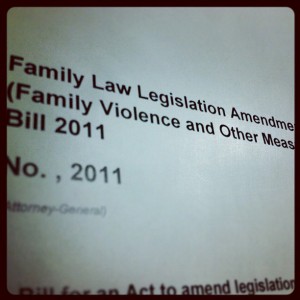 Six months on
Six months on
Amendments to the Family Law Act that changed the way the law addresses family violence in family law matters came into force from 7 June 2012. These changes were introduced by the Federal Government following more than two years worth of lobbying and input by the Australian Law Reform Commission, members of Parliament, various representatives of the legal profession and other groups of interest.
Importantly, the changes apply to all family law cases before the Family Court and the Federal Magistrates Court, regardless of whether the proceedings were started before or after 7 June 2012.
What are the amendments?
Prior to 7 June 2012, “Family Violence” was defined by the Family Law Act as “conduct, whether actual or threatened, by a person towards, or towards the property of, a member of the person’s family that causes that or any other member of the person’s family reasonably to fear for, or reasonably to be apprehensive about, his or her personal wellbeing or safety“.
From 7 June 2012, Family Violence has a more succinct definition and the legislation goes further and actually sets out a list of examples of what can include domestic violence and examples of situations that may constitute a child being exposed to domestic violence (Family Law Act, s 4AB).
Whenever a Court hears a parenting matter, the benefit to a child of having a meaningful relationship with both parents and the child’s right to be protected from physical or psychological harm are the two primary factors in considering what is in a child’s best interests. The amendments now require the Courts to give greater weight to the need to protect a child from physical or psychological harm over the benefit to the child of having a meaningful relationship with both parents.
Why were the changes introduced?
The changes to the Act were brought about for a number of reasons. Primarily, it was due to the increasing statistics of domestic violence in Australia, the apparent reluctance of victims of domestic violence to report acts of violence and the need for clarity when applying the law to parenting cases involving allegations of domestic violence. This last reason is particularly significant because more than half of the parenting cases heard before the family law courts involve allegations of domestic violence.
What do the changes mean for your family law matter?
The main changes we will see as a result of the amendments to the Family Law Act will include:
- Greater priority will be given to a child’s safety and welfare (the benefit to a child of having a meaningful relationship with both parents is not forgotten however; it remains one of the two primary considerations in determining a child’s best interests);
- There will be greater onus on advisers such as lawyers and counsellors to appropriately advise parents in matters relating to children;
- The family law courts will now have clearer access to evidence relevant to family violence which will help to improve the suitability and appropriateness of any parenting orders;
- The new definition of family violence will give greater understanding to parents of what family violence means, and clearly sets out what behaviour is unacceptable;
- Clients and their lawyers will be able to prepare clear and relevant evidence in their case as a result of the new definition of family violence (in the past it was more ambiguous);
- Child protection authorities, such as the Department of Families, Housing, Communities and Indigenous Affairs (formerly the Department of Community Services) will be able to act with greater certainty.
Despite the aim of the amendments being to assist victims of domestic violence to properly disclose relevant acts of violence and better understand what actually constitutes family violence, it is sometimes the case (unfortunately) that allegations of domestic violence raised in a family law matter are false. If a person is found to have knowingly made false allegations of domestic violence, the family law courts will continue to have the power to make costs orders against the accuser and it remains a criminal offence to knowingly make a false statement in court proceedings.
In cases that do not involve family violence, the amendments to the Act will have little impact upon how the family law courts will determine those matters.
In the future
At a State (New South Wales) level, the Government is in the process of preparing a Domestic and Family Violence Framework. This Framework is being set-up following a number of recommendations made by a Parliamentary Committee that was formed to review the current domestic violence legislation and the services available for victims of domestic violence.
The recommendations made by the Committee included the funding of specific domestic violence liaison officers throughout New South Wales, changes to Apprehended Domestic Violence Orders, particularly at an interim level, and greater attention being given to early intervention practices.
We expect to hear more about these changes when the Framework is released for public comment later in 2013. Overall, however, we can be assured that both the State and Federal Governments are trying to streamline legislation and put adequate systems in place to address family violence and to prioritise the safety and wellbeing of children.
The content of this article is intended to provide a general guide to the subject matter. Specialist advice should be sought about your specific circumstances.
Specific Questions relating to this article should be addressed directly to the author.
Stay Informed. It’s simple, free & convenient!